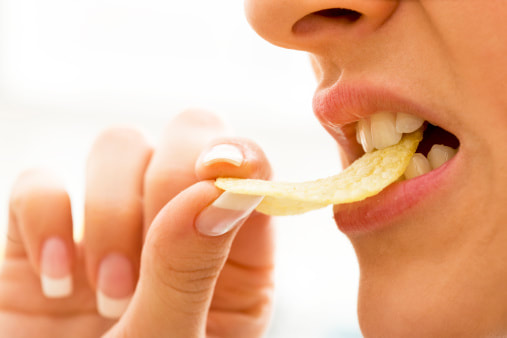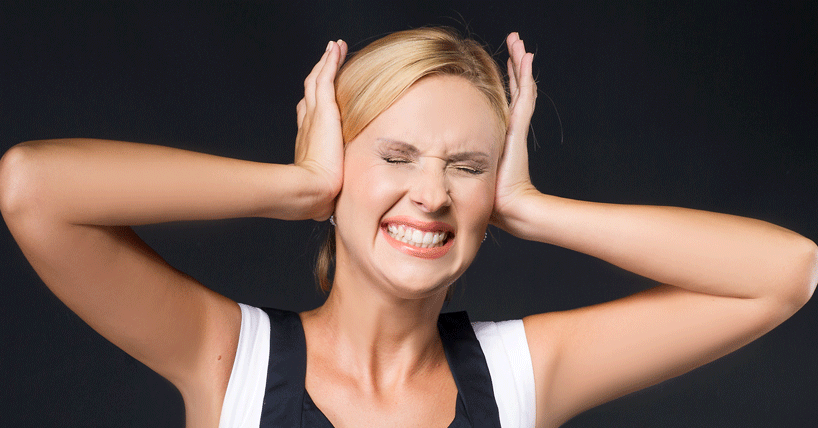 Crunchy Crisps Make You Cringe Crunchy Crisps Make You Cringe The sound of nail/chalk scraped against a blackboard, a fork on a glass or squealing cycle brakes are extremely annoying noises/sounds in general. A handful of people go overboard and find even the common ever day sounds such as clicking a pen, eating crisps or snoring trigger a feeling that makes them want to scream or hit. Such people might suffer from misophonia, a disorder where people have abnormally strong and negative reactions to common sounds such as chewing, crying or even breathing. Ask yourself these following questions and seek help if your answer is ‘yes’ to any of these:
Individuals with misophonia (the word means ‘hatred of sound’) are extremely affected by the common sounds made by other individuals that most of us don’t even pay attention to. This disorder remains unexplored and rarely studied as people suffering from it don’t mention it to their healthcare providers due to embarrassment and avoid social contact isolating themselves from gatherings to avoid any sounds that could trigger them emotionally. This cripples the treatment options available making it even more annoying. Misophonia affects the mental health of the affected person as it hinders the functioning and socializing capability and this can start any time after the age of 12. Research A new study analyzed 20 adults with misophonia and 22 adults without it asking both the groups to rate the unpleasantness of different sounds. Common sounds such as eating and breathing, universally disturbing sounds such as baby crying and people screaming and neutral sounds such as rain were included in the rating list. People with misophonia rate common sounds such as eating and breathing to be highly disturbing and both groups rate universally disturbing sounds to be annoying as well. This shows that individuals with misophonia are greatly affected by even the slightest sounds but don’t show much difference regarding other types of sounds (neutral and disturbing sounds). The study team analyzed that the part of the brain that joins our senses with our emotions (the anterior insular cortex [AIC]) was extra active and connected/wired to other brain parts differently in people with misophonia. The AIC specifically caused increased reaction in parts of the brain responsible for long-term memory, fear and other emotions. They also revealed that anger not disgust was the most common reaction of these people when they hear trigger sounds. A whole-brain MRI scan mapping participants’ brains revealed that people with misophonia had higher amounts of myelination. Myelin is a fatty substance that covers nerve cells in the brain to provide electrical insulation (just like insulation on a wire). But, we still don’t know if this is one of the reasons for extreme sensitivity to certain sounds. Diagnosis Misophonia is not classified as an auditory condition and there are no standard diagnostic criteria. Generally, people become self-aware with the symptoms. Physicians and researchers are still confused whether misophonia must be classified as a symptom or as a condition. Individuals with this disorder experience muscle tightness, increased heartbeat, body temperature, blood pressure and chest pressure that can affect his/her physical health. One study even found that 52.4% people with misophonia could also be diagnosed with obsessive-compulsive personality disorder (OCPD). Common Triggering Agents Research shows that certain sounds cause increased reaction than few others. They include:
Treatment The condition affects quality of life, but it is manageable. Certain relief methods include:
Comments are closed.
|
AVOID FRAUD. EAT SMART.+91 7846 800 800
AuthorDietitian & Nutritionist Dr. Nafeesa Imteyaz. Archives
July 2024
Categories
All
Dr. Nafeesa's Blog @blogspot |
- Home
- Written Testimonials
- Consult
- Clinics
- Blogs
-
Diet & Nutrition
- Diabetes Reversal
- IVF IUI not needed for PCOS PCOD Infertility
-
Medical Nutrition
>
-
Disease & Conditions
>
- Infertility | PCOS
- Diabetes Mellitus
- Cholesterol
- Hypothyroid
- Kidney Problems
- Hypertension
- Cardiovascular Diseases
- Liver Diseases
- Gastro intestinal disorder
- Cancer
- Metabolic Disorders
- Orthopedic Disorders
- Eating Disorders
- Dietary Recall
- Weight Record Filled By Clients
- Online Payment Transaction Details
- Online Clients Weight Check Form
- Our Program Package Service Charges
- Weight Record 2017 Clients
- Measurements sent by Clients
- Terms & Conditions Of Payment
- Thanks. Your Form is Submitted
- Video Testimonials
- Lifestyle & Wellness
- Lifestyle & Wellness Blog
- Allergy & Intolerance
- Weight Loss / Gain
- Weight Loss / Slimming Blog
-
Disease & Conditions
>
- Life Cycle Nutrition >
- Sports Nutrition >
- Integrity in Nutrition
- Knowledge Centre
© COPYRIGHT 2022. ALL RIGHTS RESERVED. FRST HEALTHCARE PVT LTD.
Dr. Nafeesa Imteyaz of First Eat Right clinic, is the Best Dietitian Nutritionist in Bangalore. Best Dietitian Nutritionist in Pune. Best Dietitian Nutritionist in Hyderabad. Best Dietitian Nutritionist in Chennai. Best Dietitian Nutritionist in Mumbai. Best Dietitian Nutritionist in Delhi. Best Dietitian Nutritionist in Kolkata.


